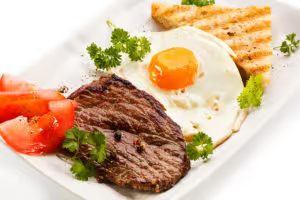Table of Contents
Phosphatidylcholine (PC, or Ptd-Cho) is one of two fatty acids that make up the outer layer of the membrane covering each of the 70 trillion cells in your body.
Phosphatidylcholine is also converted in your body through a process called hydrolysis to make up the fatty acids AA, oleic, linoleic, linolenic, and DHA. These fatty acids contribute to the signaling within and between brain cells for long-term potentiation (LTP). LTP is behind the formation of long-term memories.
The synthesis of the neurotransmitter acetylcholine (ACh) is largely dependent on the choline provided by Phosphatidylcholine. ACh is critical for cognition, learning and memory.
When you don’t have enough Phosphatidylcholine, brain cell membranes lose integrity and eventually die.
Some Phosphatidylcholine (PC) is naturally synthesized in your body. We also get PC from some of our food including beef, oysters, eggs and some vegetables. As a nootropic supplement, Phosphatidylcholine is derived from lecithin found in soybeans and sunflower seeds.
Note that lecithin and Phosphatidylcholine are NOT the same thing. Plain lecithin is not an efficient source of Phosphatidylcholine or choline. As a nootropic, look for as pure of a source of Phosphatidylcholine (PC) as you can afford.
Phosphatidylcholine helps:
- Neuroprotection: Phosphatidylcholine (PC) is a major component of brain cell membranes. And neurons use some of this choline to synthesize acetylcholine (ACh). Supplementing with PC restores the PC that is needed for brain cell membrane integrity. While providing neurons with the ACh needed for memory and learning.
- Neurotransmitters: Phosphatidylcholine increases concentrations of choline and acetylcholine in the brain. Improving memory and cognition.
- Neurogenesis: Phosphatidylcholine helps restore damaged brain cells. Making them more fluid and permeable allows the proper flow of chemical messengers and nutrients into and out of the cell. And improving overall cell function and efficiency. Resulting in better cognition, learning, memory, and mood.
Overview
Phosphatidylcholine (PC, or Ptd-Cho) is a phospholipid that plays a critical role in every cell in your body. Including your brain.

Your brain cells are each encased in a membrane. This bi-lipid layer of two fatty acid tails face each other. The outer layer of each cell contains mostly the phospholipids phosphatidylcholine (PC) and sphingomyelin, while the inner layer contains predominantly phosphatidylserine (PS), phosphatidylinositol, and phosphatidylethanolamine.
The outer layer of each cell membrane is highly permeable. But the inner layer is much less permeable. These two fatty acid tails are in a constant state of movement, vibrating at millions of times a second. This continual vibration could be considered the ‘backbone of life’. And is the basis of everything that happens in your brain.
The amount and type of long-chain fatty acids in your diet affects the composition of these cell membranes. The structure and function of your cells depend on the ideal balance of fats including cholesterol, oleic, palmitic and stearic fatty acids. And essential fatty acids like Omega 3. Without this proper balance, cell membrane function is compromised.
And you can be sure that our modern diet does not provide the ideal balance of fatty acids (phospholipids) to maintain brain cell integrity. It’s why you experience brain fog, memory loss, slow thinking and poor decision making.
Some progressive health care researchers and practitioners have found that supplementing with phosphatidylcholine (PC) can lessen the symptoms of diseases like MS, diabetes, immune system problems, asthma, and neurodegenerative diseases like Alzheimer’s.
You naturally get phosphatidylcholine (PC) from foods such as beef, eggs, oysters, broccoli and brussel sprouts. Supplemental phosphatidylcholine (PC) is made from lecithin found in soybeans and sunflower seeds.
Phosphatidylcholine (PC) maintains the integrity of brain cell membranes. And is directly involved in acetylcholine (ACh) synthesis. ACh is needed for cognition, learning and memory formation.
How does Phosphatidylcholine work in the Brain?
Phosphatidylcholine boosts brain health and function in several ways. But two in particular stand out.
- Phosphatidylcholine is needed for long-term memory. The hydrolysis of Phosphatidylcholine (by a process called phospholipase A2-catalyzed hydrolysis) is used to make the free fatty acids AA, oleic, linoleic, linolenic and DHA.
These free fatty acids facilitate synaptic transmission by targeting nicotinic ACh receptors using protein kinase C (PKC). This messenger system is needed for long-term potentiation (LTP). Researchers have determined that these fatty acids are critical for learning and memory.[i]
- Phosphatidylcholine helps repair neurons. Cholinergic neurons are unique among cells because they serve two functions. PC is a major component of brain cell membranes. And serves as a storage pool for the choline needed as a precursor for acetylcholine (ACh) synthesis.
Researchers demonstrated how this works. They incubated human cholinergic cells in the lab. And followed the metabolic link between membrane composition and turnover, and ACh synthesis. And proved that ACh is synthesized from choline derived from the degradation of Phosphatidylcholine.
If there is not enough choline available to maintain brain cell membrane integrity, and to synthesize the neurotransmitter acetylcholine, brain cell function breaks down. You experience brain fog, poor memory and decision making. And ultimately leading to neurodegenerative diseases like Alzheimer’s, and other motor neuron disorders.[ii]
How things go bad
As you get older, your brain chemistry and energy metabolism changes. This can happen at any age once you enter your adult years. Low Phosphatidylcholine levels have even been found in newborn babies.
↓ Brain cell membranes degenerate
↓ Recall, reaction time and mood diminish
↓ Acetylcholine levels decline
All of these changes can happen at any age. Your body is influenced by the food you eat, what you drink, lifestyle habits, the air you breathe and more.
So Phosphatidylcholine can help for age-related cognitive decline, as well as a student looking to do better in school.
Phosphatidylcholine benefits
Phosphatidylcholine (PC) has been around as long as humans have walked this planet. PC is a critical component of the top layer of the membrane surrounding each one of the cells in your body.
And yet some are talking about Phosphatidylcholine as the “New Wonder Drug”. How could this be? Turns out that PC is a fatty acid. As are many of the fats you consume in your modern diet.
Long-chain fatty acids affect the composition of your cell membranes. When you eat bad fats your cell membrane fluidity is affected, ion channels disrupted, hormones, regulation of neuroreceptors, signaling and other signaling chemicals are affected.
Incorrect amounts or types of long chain fatty acids can lead to a cascade of serious health and cognition problems.
The easiest and simplest way to correct many of these cognition problems is to supplement with Phosphatidylcholine as a nootropic. You’ll feel better as cells are repaired. Digestion issues could be eliminated or minimized. And brain fog, cognition and memory problems could become a non-issue.
How does Phosphatidylcholine feel?
If you eat a perfectly healthy diet and are in optimal physical and mental health, using Phosphatidylcholine may not do anything for you.
But if you’re like most in the Western world relying on fast food, processed food and other unhealthy lifestyle habits, then PC may help.
Neurohackers report that supplementing with Phosphatidylcholine lifts brain fog, improves working memory and boosts alertness.
Others say it helps them prevent anxiety and panic attacks. Mental clarity is improved, and energy levels rise.
Ray Kurzweil, the famous inventor and futurist, gets phosphatidylcholine intravenously once a week at his health clinic. His theory is that this will rejuvenate all his body’s tissues.[iii]
Phosphatidylcholine Clinical Research
A double-blind study in California with 80 college students investigated the effect of Phosphatidylcholine on memory. The students received a placebo or either 10 or 25 grams of Phosphatidylcholine (PC). 25 grams of PC was estimated to supply about 3.75 grams of choline.
Memory was tested at 60 and 90 minutes after taking PC. The researchers recorded a significant improvement in memory after 90 minutes, and only a slight improvement after 60 minutes.
This 1993 study was the first to test the relationship between a single dose of Phosphatidylcholine on memory in healthy human subjects.[iv]
Phosphatidylcholine Prevents Brain Cell Death
Streptococcus pneumonia is the most common cause of bacterial meningitis. And is the most common cause of death from pneumonia. If it doesn’t kill you, it can cause paralysis, mental retardation and learning disorders.
In humans, it’s your hippocampus neurons that are the first to die as a result of meningitis. Cell death is officially called “apoptosis”. But I’m using cell death to drive a point home.
Phosphatidylcholine (PC) is an essential component of your cell membranes. And a deficiency of PC, either from chemicals, disease, or bad nutrition leads to cell death. And the first to go are your hippocampal neurons. The same neurons used for learning and memory.
Researchers in Tennessee found that a variety of brain cells die after you get pneumonia. Because it interferes with Phosphatidylcholine synthesis. And apoptosis inhibitors can’t even stop this cell death from happening.
The research team determined that the only way to prevent cell death from pneumonia infection was supplementing with Phosphatidylcholine. Even after the infection set in.
The researchers concluded that supplementing with Phosphatidylcholine was the best way to prevent what they called an “apoptotic cascade”. And the best therapeutic intervention.[v]
Phosphatidylcholine Improves Memory
Studies on the effect of Phosphatidylcholine on memory are limited. So researchers in Japan decided to remedy this lack of data by testing PC in mice with dementia.
They administered PC to mice with dementia and to normal mice. And compared differences in memory, choline and acetylcholine concentration, and choline acetyltransferase (ChAT) activity. ChAT is the enzyme responsible for the synthesis of acetylcholine in the brain.
The researchers found that giving phosphatidylcholine for 45 days to mice with dementia improved memory. And generally increased brain choline and acetylcholine concentrations to or above the levels of the normal control mice.
The research team concluded that phosphatidylcholine increases brain acetylcholine concentration and improves memory.[vi]
Phosphatidylcholine recommended dosage
Recommended Phosphatidylcholine dosage is 1,200 mg to 5 grams per day. And divide your total daily dose into 2 or 3 equal doses and dosed throughout the day.
To enhance bioavailability and boost absorption, take PC 30 with a meal or tablespoon of unrefined coconut oil or extra virgin olive oil.
Do not take Phosphatidylcholine with acetylcholinesterase (AChE) inhibitors since this combination may excessively increase acetylcholine (ACh) levels and potentially cause cholinergic side effects. AChE inhibitors include donepezil (Aricept), Tacrine (Cognex), rivastigmine (Exelon) and Huperzine-A.
Phosphatidylcholine Side Effects
Phosphatidylcholine is naturally produced in your body and is considered well tolerated and safe. PC is not toxic.
Some may experience sweating, stomach upset and diarrhea. Particularly if you’re already high in choline.
Type of Phosphatidylcholine to buy
Phosphatidylcholine is sold in tablet, capsule, liquid and powder form. Capsules can run from 420 – 1,300 mg each. 500 mg of Phosphatidylcholine in powder form is equivalent to 2-level 1/8 tsp scoops.
Phosphatidylcholine is sometimes used interchangeably with “lecithin” which is misleading and simply not accurate. Choline is a component of phosphatidylcholine, and is also found in very small amounts in plain lecithin. Although closely related, these terms are not the same.
You will experience the nootropic benefits by supplementing with Phosphatidylcholine but not with lecithin.
Nootropics Expert Recommendation
Phosphatidylcholine 1,200 mg to 5 grams per day
 I recommend using Phosphatidylcholine (PC) as a nootropic supplement.
I recommend using Phosphatidylcholine (PC) as a nootropic supplement.
Phosphatidylcholine helps build and repair cell membranes. And is found in every one of the 70 trillion cells in your body.
You can get Phosphatidylcholine from some of the food you eat. But Phosphatidylcholine is only found in foods like beef, eggs, oysters and some vegetables. PC levels decline as you age and you are unlikely to get nearly enough through diet. So to get its benefits you must take it as a nootropic supplement.
Phosphatidylcholine is vital to maintaining optimal brain health. And has been shown to increase cognitive energy, boost brain function, enhance communication between neurons, and protect neural membranes from free radical damage.
I suggest starting with a dose of at least 1,200 mg daily. Phosphatidylcholine is a great compliment to a stack including any nootropic from the racetam-family. Anything that causes an increase in uptake of acetylcholine in your brain.
You need to provide your brain with the choline it is demanding. Or it starts cannibalizing your own brain cells to make more acetylcholine. Signs that you’re lacking adequate choline or acetylcholine are headaches.
Use Phosphatidylcholine at a ratio of 1:4. For example, 250 mg of Phosphatidylcholine to 1,000 mg of Aniracetam.
If you have liver damage like cirrhosis, you may want to increase the dose up to 4.6 grams per day for liver repair.








Join The Discussion - 141 comments
John
March 15, 2022
Hey there David thanks so much for all the info on your website but im curious is it safe to take alpha gpc and Phosphatidylcholine together in a stack?
David Tomen
March 17, 2022
John, yes it’s safe.
Gary Smith
February 13, 2022
Hi David, I am wondering what you think about NOW’s product. They call it Sunflower Lecithin but claim it has phosphatidyl choline along with some other phosphatides. This is the only product I could find that is vegan and does not contain bovine or gelatin.
NOW Supplements, Sunflower Lecithin
David Tomen
February 14, 2022
Gary, Phosphatidylcholine (PC) comes from sunflower lecithin. But as a nootropic it is not a good source of PC if your intention is to supplement with PC. Because there is no way to tell what dose of PC you are getting from lecithin.
I see this all over the place that you can use lecithin as a nootropic. It’s a lie. Lecithin has some nootropic value but we have much more effective ways to get Phosphatidylcholine (PC) we need and that is by supplementing with Phosphatidylcholine (PC).
Gary Smith
February 14, 2022
Thanks. I wish I could find caps so I could at least open them. Every product is softgels. Ugh.
David Tomen
February 16, 2022
Gary, you can get a tub of PC powder from this company: https://amzn.to/3LBkQBQ. But it’s from soy instead of sunflower. I cannot find a tub of PC powder made from sunflower unfortunately.
Gary Smith
February 16, 2022
Thanks, David. Appreciate the hep. Last question, the powder you linked to says to use 4 grams. The other PC products I am looking at say a serving is 1.2 g or 420 mg of PC. Do you think I can get away with taking about 1/3 of the their recommended dosage? The other products are also soy lecithin.
David Tomen
February 18, 2022
Gary, the recommended Phosphatidylcholine dosage is 1,200 mg to 5 grams per day. The get the effects you are looking for with this nootropic you’ll need to use minimum 1,200 mg per day.
Dana
August 27, 2022
Thank you, very much, for this informative article! Regarding this link you provided, it is not pure PC. It is from lecithin.
https://geni.us/YNq0ANt (Amazon)
Are you aware of any pure PC?
Thank you, kindly!
David Tomen
August 31, 2022
Dana, the only way to get “pure” phosphatidylcholine or phosphatidylserine is from lecithin.
Some Phosphatidylcholine (PC) is naturally synthesized in your body and that is arguably the only “pure” PC there is. If you are going to supplement with PC then it will be from either soy or sunflower lecithin.
Dana
August 29, 2022
Hi David!
You can disregard the question I sent the other day. I figured out what I was misunderstanding.
If you ever found a sunflower powder, would love to know.
Thank you, kindly!
Gary Smith
February 14, 2022
No luck on finding capsules I can open.
This is the powder I bought. Tell me it’s okay? 🙂
I am taking PS100 and Alpha GPC per your suggestion. Can I live with just those two?
NOW Supplements, Sunflower Lecithin
David Tomen
February 16, 2022
Gary, I responded to your comment under my Phosphatidylcholine review. The problem with this one from NOW is the same problem I commented on before. There is no way to tell how much PC you are getting from this lecithin powder. You can get a tub of PC powder here: https://amzn.to/3LBkQBQ
Rob
February 10, 2022
So im confused. I take Bodybio PC. Theirs is a complex and i believe it also has phosphatidylserine and the other phospholipids that you mentioned present but the product is called PC. My question is…. is PC always made up of several phospholipids bound together or is it just one lipid and it just so happens this brand are focusing on marketing PC despite the presence of other lipids in their product?
David Tomen
February 11, 2022
Rob, Phosphatidylcholine is one phospholipid that makes up the outer layer of the bi-lipid cell membrane.
Bodybio PC contains Phosphatidyl-Choline, Phosphatidyl-Ethanolamine, Phospatidyl-Inosiyol, minor glycolipids. A proprietary blend of essential fatty acids linoleic and alpha linolenic, minor fatty acids, ethanol.
You will find this information in detail in my review above.
Pieter Van der Merwe
September 6, 2021
When would you use Inositol and when Phosphatidylcholine
David Tomen
September 7, 2021
Pieter, I want you to read my review for Inositol and Phosphatidylcholine. Open each in a separate tab preferably on a PC or tablet so you can compare them side-by-side. Then tell me what you think based on that.
I’m doing it this way because it is the only way you’ll get a complete understanding on how and why each of these nootropics benefits your brain.
LEE TURNER
August 4, 2021
Hi David, enjoyed your books! Two comments:
1. If I’m taking centrophenoxine, do I still need a PC source?
2. In your book, Nootropic Secrets, you state on page 29 under Iodine: “Dosage for a healthy adult is 25 – 50 mg per day. Supplemented with selenium. Brazil nuts are a great source of natural iodine. One Brazil nut can give you your daily dose.” Is that a typo? I looked through 5 nutritional profiles and iodine is not mentioned in Brazil nuts.
David Tomen
August 6, 2021
Lee, Centrophenoxine should be taken with a choline source like Alpha GPC or CDP-Choline which are more effective that PC for something like this.
And it is Selenium that is found in Brazil Nuts and not iodine. It takes one or two Brazil Nuts to give you enough Selenium for the day.
MattD
July 7, 2021
Hi Dave,
You mention not to combine PC with AChE inhibitors. Would that include things like Lemon Balm and black seed oil? How about if taking other choline sources like Alpha-GPC? Is is better to avoid all AChE inhibitors completely when supplementing with extra Choline sources?
Thanks
David Tomen
July 7, 2021
Matt, this applies more to prescription drugs that are AChE inhibitors. As for natural AChE inhibitors you should just be aware of it. Because excess acetylcholine will produce side effects you do not want.
And this is more common than you’d expect. I’ve seen people put together 5 – 6 supplements that all boosted acetylcholine and/or acted as an AChE inhibitor and they couldn’t figure out why they felt so bad.
Mo
October 17, 2022
Hi David,
Really appreciate your site and all the research you’ve done! This info is tough to come by in a format that someone with brain injury can understand.
I too am wondering about the AChE inhibitor disclaimer..
I’m recovering from some pretty severe brain inflammation and atrophy, and recently began taking Quicksilver Scientific’s Micellized Pure PC (I was advised to take 650mg 2 to 3 times a day on an empty stomach at least 10mins before meals).
Since caffeine is apparently technically an AChE inhibitor, would you think it unwise to continue to consume (in careful moderation) tea/coffee or energy drinks while taking the Pure PC 2-3 times a day?
I had been taking an energy stack that contained Huperzine A on and off between January and June, but laid off of that since I realized I was relying on it too often considering how the longterm effects are still a mystery. It helped but I’m hoping I didn’t actually make matters worse by using that over the months, for sometimes days at a time, at one point for up to 2 or 3 weeks when I first tried it before learning the importance of cycling it.
The PC supplement came highly recommended as part of my treatment, but no one mentioned the AChE inhibitor concern, or whether caffeine or additional choline sources would potentially be problematic with that kind of dosage schedule. I won’t be adding any choline supplements, but I have been told to work in more food sources of choline like eggs, almonds, etc. It sounds like the PC should help a lot, but the contraindication concerns feel like a bit of a minefield to navigate..
Kind regards,
Mo
David Tomen
October 22, 2022
Mo, Google “symptoms of too much acetylcholine”. That will show you what to watch out for with excess acetylcholine.
Mo
November 3, 2022
Thanks David. I stayed mindful of overdoing it, but didn’t notice much of an effect from the liquid PC, so I opted to go for weekly IV infusions of it. When I asked about the caffeine, they said one cup probably won’t hurt, but they also pointed out that if my aim is to reduce the inflammation, it would be wise to limit consumption of inflammation triggers like energy drinks anyway As for the choline sources, I’ll just keep some variety in my diet. It shouldn’t become an issue as long as I’m keeping things in moderation.
Matt
May 6, 2021
I wanted to share my source of Phosphatidylcholine (PC). It is the NOW brand tub (1lb) of sunflower lecithin powder (not capsules). You get about ~2.5G of PC per 1 1/3 tbs. It’s not organic but it is non-GMO. Lasts about a month and a half. I’ve been taking it for months with very good success in my morning drink mix.
It’s on Amazon, but it is even more affordable on vitacost.
David Tomen
May 6, 2021
Thanks for the tip Matt.
André Leroux
March 15, 2021
According to Ray Kurzweil the “Top 3 Supplements” are Phosphatidylcholine, Vitamin D, and Coenzyme Q10 (Ubiquinol ?) to address the many factors involved in the aging process.
Do you agree with this, David?
David Tomen
March 15, 2021
André, that may be what Ray Kurzweil needs. But maybe not what you need to slow the aging process down. That is an over-simplification of the aging process in humans.